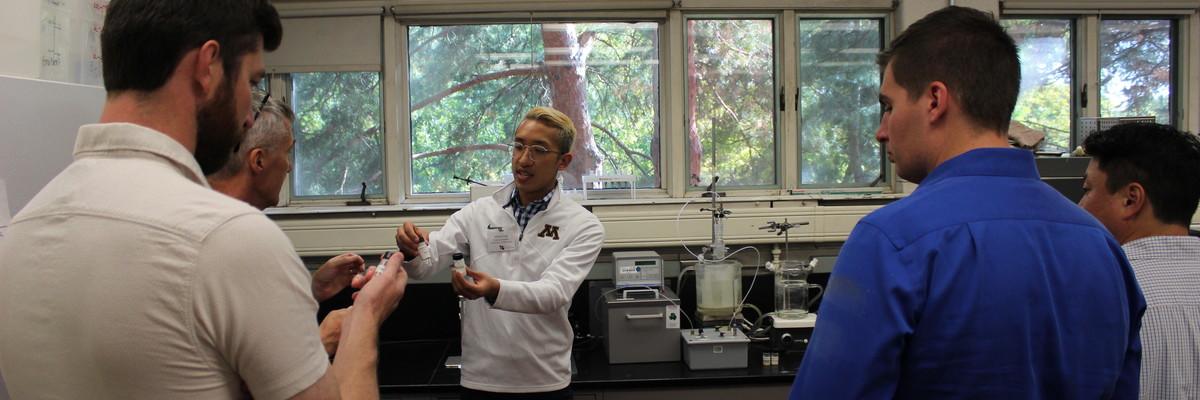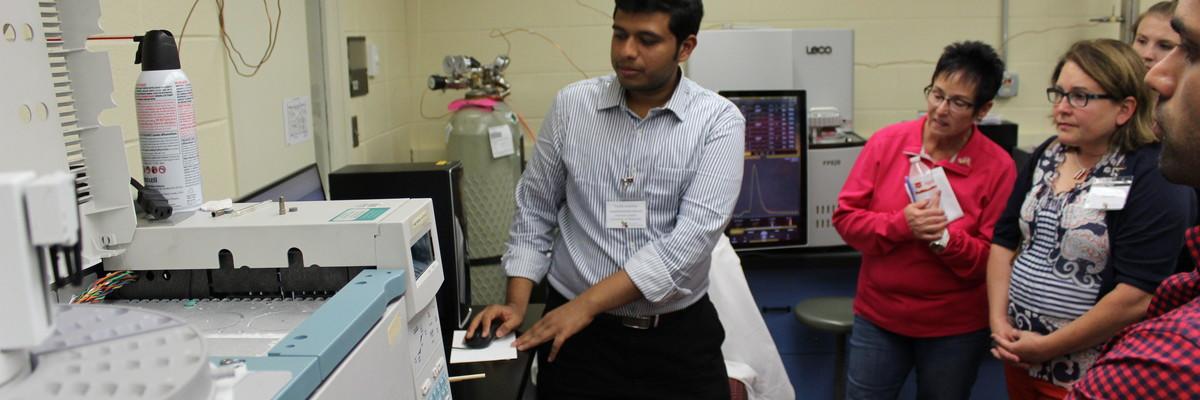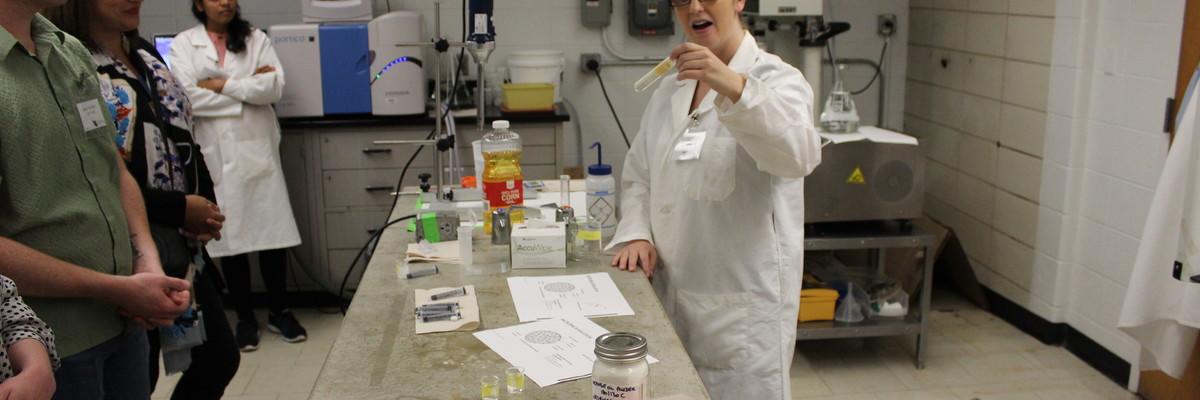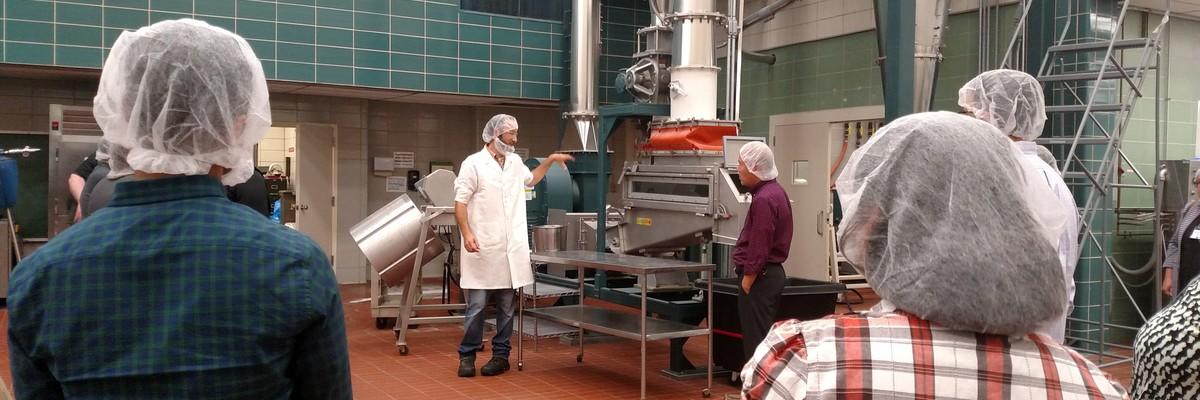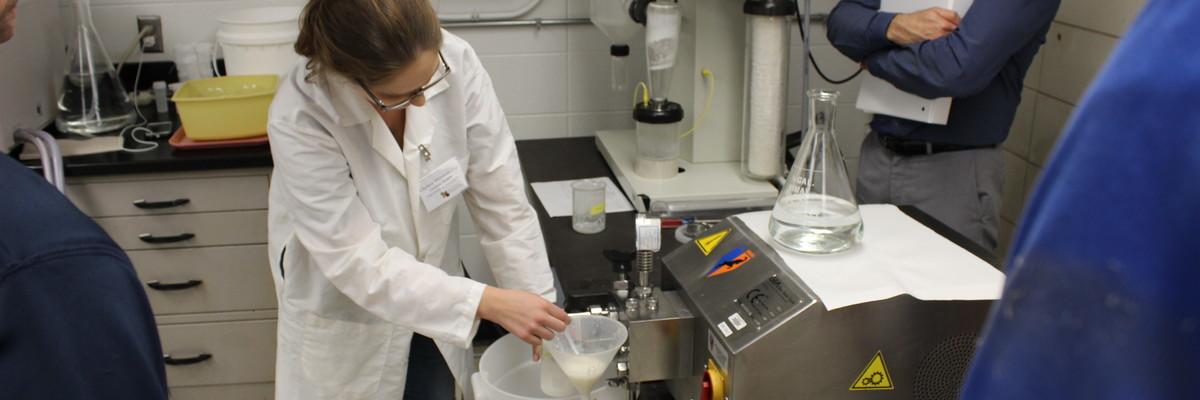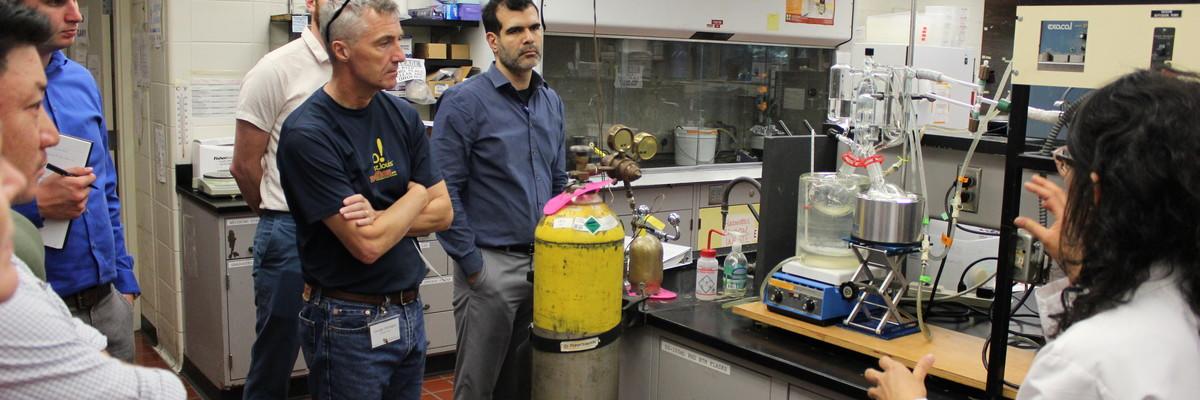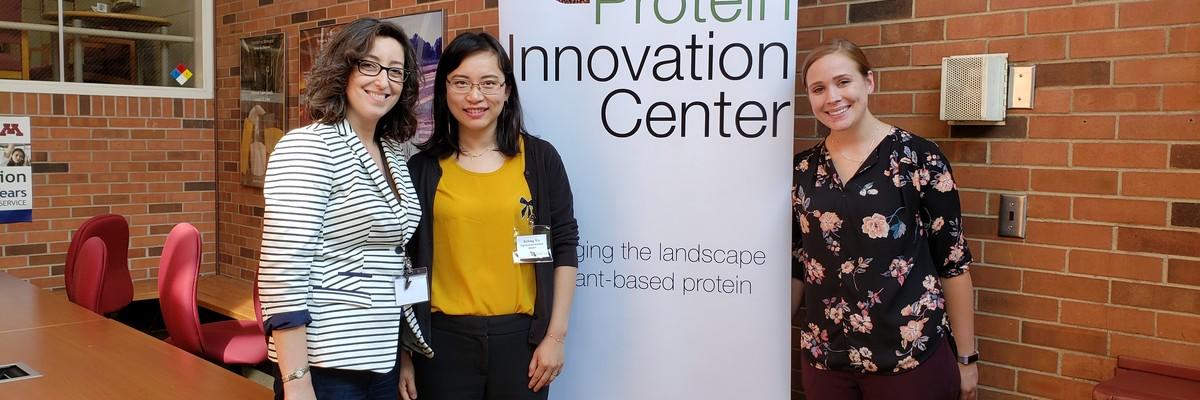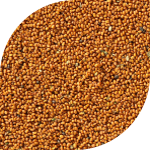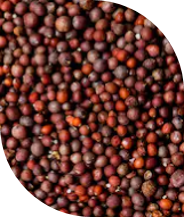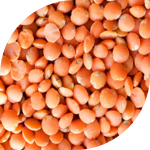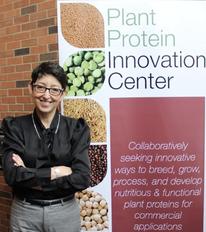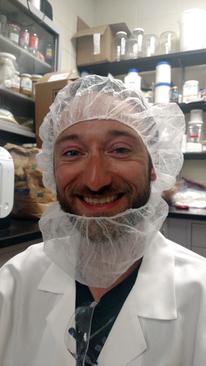"Protein Basics Short Course" a Success!
The Plant Protein Innovation Center's first "Protein Basics Short Course" was held September 5th and 6th, 2019. The course drew 47 attendees from a variety of backgrounds and companies/organizations across the United States. The event featured a diverse set of speakers from industry and academia who covered market trends (current and emerging), an overview of food proteins, basic protein chemistry with emphasis on structure/function relationship and assessment, production of protein ingredients, protein modification to enhance functionality, formulating with proteins from different sources and related challenges, protein nutritional quality and assessment, as well as flavor and protein interactions. The course also featured demonstrations and experiences in our pilot plant and analytical laboratories. Did you miss out this year? No worries! The course will be held again next year! Subscribe to receive PPIC communications so you don't miss a beat.
"I think this course was very well done, organized, managed. As an attendee, I was able to get an overview of protein (chemistry review) and relate it to my position within my company."
"Speakers were extremely knowledgeable and engaging. Attendance as small enough that dialogue was possible. Just the right amount of networking opportunities. Excellent blend of "classroom" lectures and hands-on demos. The course provided good insights to PPIC areas of expertise, equipment, focus."
"I liked that the presentations included protein chemistry, plant protein nutrition, taste, and use in applications, as well as presentations from customers and ingredient suppliers. These talks brought the topic of plant proteins full circle."
"Keep doing what you're doing. It was excellent and I've already recommended it to others. I loved the student involvement and clear passion (it's contagious)!"
2019 Speakers
B. Pam Ismail, Ph.D., Associate Professor; Director, Plant Protein Innovation Center, Dept. of Food Science and Nutrition, University of Minnesota, 1334 Eckles Avenue, St. Paul, MN 55108
e-mail: [email protected]
Phone: +1 612 625 0147
Dr. Pam Ismail, is an Associate Professor, Department of Food Science and Nutrition, University of Minnesota. Dr. Ismail is the founder and director of the Plant Protein Innovation Center. She has over 20 years of experience in Food Chemistry research focused on analytical chemistry, protein chemistry, and chemistry and fate of bioactive food constituents. Her research focuses on chemical characterization and enhancement of functionality, safety, bioavailability, and bioactivity of food proteins and phytochemicals, following novel processing and analytical approaches. Protein structural characterization is performed using a number of proteomic analytical tools, aiming at linking structure to function. Dr. Ismail has established a collaborative research program focused on developing plant-based protein ingredients, while addressing industry-identified challenges and opportunities, and while seeking sustainable and environmentally friendly sources. Her research has been supported by several funding sources including USDA, Minnesota Department of Agriculture, Midwest Dairy Association, Dairy Research Institute, Healthy Foods Healthy Lives, Forever Green Initiative, General Mills Inc., PepsiCo, and Schwan's, among others. Dr. Ismail teaches a senior undergraduate level Food Analysis course and a graduate level Protein Chemistry course, and is the recipient of several teaching awards including “Distinguished Teaching Award” and an “Outstanding Professor Award”.
Gary Reineccius, Professor and Head, Department of Food Science & Nutrition, University of Minnesota, 1334 Eckles Avenue, St. Paul, MN 55108
Dr. Gary Reineccius has been actively involved in flavor research for more than 47 years. During this time he has published over 230 research articles. His research focuses on two areas: flavor related challenges and ingredient encapsulation. Flavor work has been quite broad covering methods for flavor analysis, off flavor identification and remediation, flavor release in the mouth when eating and its encapsulation (protection and controlled release).
Currently he is conducting three research projects on plant proteins. One project is focused on identifying the chemical components in pea protein isolates that contribute off flavors and the second is similar but targets pennycress protein isolates. Our assumption is that the industry can better design processing techniques to provide bland protein isolates if the offending odorants are known. The third project is focused on improving the stability of flavorings when added to foods containing plant protein isolates. There is evidence that flavor components will form covalent bonds with the sidechains of proteins thereby removing their contribution to flavor perception.
James House, Professor and Head, Department of Food & Human Nutritional Sciences, University of Manitoba
Dr. House is Professor and Head of the Department of Food and Human Nutritional Sciences, University of Manitoba. He has research expertise in 3 primary areas: 1) Nutritional biochemistry, particularly related to the interactions between water-soluble vitamins and amino acid metabolism; 2) Egg and poultry science; and 3) Quality of plant-based proteins for the human diet. He has organized national workshops in Canada related to plant protein quality, and has published both original research, reviews and commentaries related to the regulatory aspects of measuring protein quality in North America.
Dr. House has extensive collaborations with researchers across Canada, the U.S. and internationally, and has worked with leading ingredient and food manufacturing companies, as well as commodity organizations, to advance our understanding of the factors influencing the quality of protein in human foods. In addition to his appointment within the Faculty of Agricultural and Food Sciences, University of Manitoba, Jim is also a Research Scientist within the Richardson Centre for Functional Foods and Nutraceuticals, and the Canadian Centre for Agri-Food Research in Health and Medicine, both in Winnipeg, MB. Jim currently serves as the President for the Canadian Nutrition Society (2018-19).
Bicheng Wu, Ph.D., Global Savory Applications Manager, Ingredion Incorporated
Bicheng Wu is a Senior Associate in the Global Applications Group at Ingredion. She manages the Savory Applications Team, leading and overseeing projects related to starch, flours and emerging clean label ingredients. During her four years at Ingredion, Bicheng was involved in scouting and development of new protein-based ingredients. In addition, she has led and supported global launch of new pulse ingredients including HOMECRAFT® and VITESSENCE™ Pulse CT (Clean Taste) ingredients, which won the IFT 2017 Food Expo Innovation Award. Prior to joining the Company, Bicheng did her Ph.D. study at University of Massachusetts at Amherst, focusing on using emulsion technology and protein-hydrocolloids interactions for improving texture of reduced-fat foods. Bicheng also holds a Master’s degree in Food Science from Purdue University, when she worked at the Whistler Center for Carbohydrate Research. Bicheng has published 12 peer-reviewed articles and 1 book chapter based on her past research work.
Sara Rosene, Associate Principal Scientist, General Mills
Sara Rosene is an associate principal scientist for the protein arm of long-term research (Nutrition and Technology Solutions) at General Mills. In her role, she works across all the GMI business platforms for their protein functionality and fortification needs. Prior to General Mills, she worked in dairy protein ingredient development and applications. She is a graduate of the University of Minnesota and resides in New Hope, MN.
Mitchell Maher, Junior Scientist, Pilot Plant, University of Minnesota
Mitchell Maher grew up on a farm in western Minnesota. He came to the University of Minnesota in 2005 to pursue a degree in Nutrition Science; he transferred into Food Science after a short time. He worked in the Joseph J. Warthesen Food Processing Center (also known as the pilot plant) as an undergraduate. After graduation, he worked for a short while for French Meadow Bakery Division of Rich Product. Shortly after that, he came back to work at the pilot plant. He has been with the pilot plant at the University of Minnesota for almost 12 years doing research and production, including extrusion and everything from dairy production to flavors. Mitchell’s hobbies include brewing beer and smoking meat.
